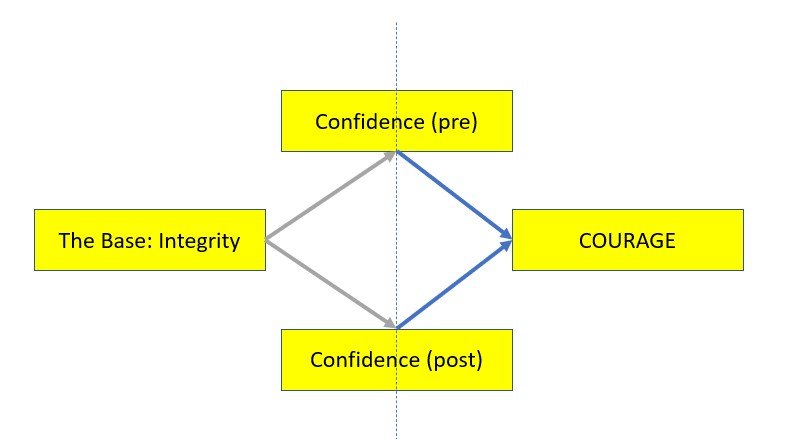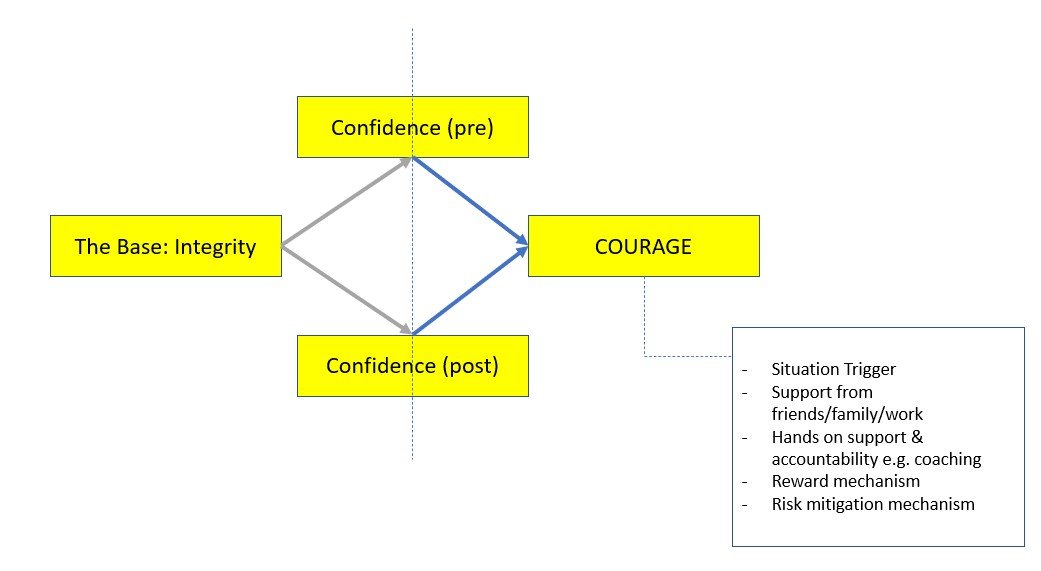noun: confidence
the feeling that you can trust, believe in, and be sure about the abilities or good qualities of someone or something.
noun: courage
the ability to do something that frightens one; bravery.
For quite some time, I didn’t appreciate the significant distinction between these two terms, which are sometimes used interchangeably. The critical distinction of knowing and doing.
I’m reminded of it more and more when I coach. When my clients get to a point where they are so sure about themselves, so absolutely convinced about something they think or know, and with an unshakable belief, speaking with conviction and certainty, with the energy and elation of an ‘a-ha’ moment. Yet, sometimes this progress doesn’t find its way into action.
And there is that moment that we have all felt, that pause that leaves so much unspoken, but in that pause we know: something is going to stop us from taking action. From making a move. From creating change. From stepping outside of our comfort zone into the unknown. From overcoming our fear. From being brave. From having courage.
As much as we might know something, and feel it deep inside, that’s where it will stay if we don’t find the courage to do something about it.
So how do we find courage?
There’s three elements I would suggest starting with:
- Confidence and strong belief in yourself and what you’re thinking, before you take action
- Confidence that regardless of the outcomes, you will not regret your actions
- Integrity as the base for both of these
noun: Integrity
the quality of being honest and having strong moral principles.

Starting with confidence and strong belief in yourself and what you’re thinking is an important first step. Whether you are clear on this, or at the start of your journey to working out what you know now, what you believe and what you want, take the time to do the groundwork. The confidence will come from your own certainty. That certainty could be about knowing exactly what you need or want to do, or the certainty that you need/want to do something differently.
The double hit is also thinking about having confidence that regardless of the outcomes, you will not regret your actions. You can start with some ideas and scenario planning of what you could do and how it could work out, and thinking about how you might mitigate or mentally prepare for some of those outcomes.
As an example: there is an opportunity to go for a new role at work. This is not seen as a natural promotion from your current role, but you feel that it would make you much happier to make a slight pivot in your career progression and you have identified how it might be done in your current company.
Using integrity as your base, be honest with yourself about why this is important for you, work out why it makes sense for the business – do this in a way that you have complete confidence this is an opportunity for both you and the business. You might want to talk to others inside or outside the business to help put your thinking together.
If you are holding yourself back from taking action, think about what would happen if you did put this forward to the business. How might they react? If you are coming from a place of honesty without bad intentions, how might you respond to different reactions? What’s the worst that could happen, and how might you mitigate those consequences?
Do what you need to do to reduce the risk and the fear of taking action, and importantly, think about the risk and the fear of taking no action and how that might leave you feeling now and in the future.
As you prepare, you might start to feel more motivated, more energy, more drive and certainty. It’s time to finalise courage – work out how to take action at the right time and in the right way. Take the time to think through this and prepare further.
If there is still a mental struggle for you to take action, consider some of the elements that have previously given you strength and courage in your life.

Pull on strength from other parts of your life or other mechanisms to take the edge of slightly, but remember, courage is the ability to do something that frightens one; bravery. It is not about the absence of fear. By definition, courage is about taking action in the presence of fear, where integrity and confidence can help give you inner strength and conviction that regardless of the outcomes, it was better to have taken action than to have done nothing about it.
I find this distinction really valuable to keep returning too, and to share when I am coaching.
It’s not always easy, but there are ways to get there that can reap benefits for your own happiness, presenting opportunities and possibilities that would otherwise be left latent if you stop at the knowledge that something is holding you back. Push past it and don’t look back.